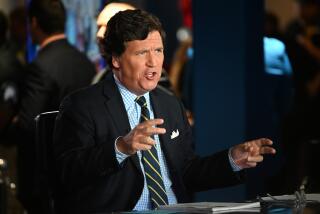Battle being waged about adding a third TV channel, one that would carry paid advertising : SWEDEN PONDERS COMMERCIAL QUESTION
- Share via
The year just ended has been punctuated by the bubble-bubble, toil and trouble in and around the television industry.
Buy-outs, sellouts, mergers, firings and the Sturm und Drang aren’t limited to the American TV biz.
It’s even going on in Sweden, the noble Nobel nation, where there’s a battle being waged about whether there should be commercials on television. In an ironic contrast to the United States, where commercial television is not usually considered a hallmark of quality, in Sweden many vocal television and business executives are attempting to shape quality programming through what, for them, is the revolutionary concept of commercials.
Television began in Sweden with one channel in the late ‘50s, appropriately named TV One, which might not be catchy, but it is sensible, and so are Swedes.
The programming concept for Sweden’s TV One was based on the British Broadcasting Corp.(BBC) model: no commercials, high-quality productions, government-owned. In 1968, the government created TV Two to supply different programming. In hardly any time at all, both channels were doing or buying similar shows.
Today, there are 3.2 million TV sets in Sweden, and--like the British--every home that has one must pay a yearly license fee of about $130 to the government for the privilege. A householder only pays one license fee even if the house has several sets. Fees are less for black-and-white sets.
With that license fee, the state collects about $400 million a year, which supports the Air Monopoly--two government-owned TV channels and three regional radio networks. All of the programs and the personnel who run them are paid from the monies obtained from those license fees.
In Sweden, once a person has a job for six months, it’s forever . . . even in television.
We’re talkin’ tenure after half a year, with all the perks--yearly salary increases, lifetime health plan, annual mandatory six-week vacations, a fully paid year’s maternity leave which the father or the mother can take, day care for children, etc.
And from those perks has grown a peck of problems, which became evident even in casual conversations when I was recently visiting Sweden. Almost everyone in the entertainment business has a strong opinion.
Walking her bike toward the Old Town section of Stockholm, Stina Lundberg, 35, Sweden’s most celebrated TV journalist, talked about one of them: “It’s nice to know you can’t be fired, but it’s sick! Eight new people have been hired by the networks in the last 20 years! I now work as a free-lancer,” she said, “and I’m usually the youngest person on a shoot.”
While in America, according to a recent survey from the Bureau of Labor Statistics, one person out of every three aged 55 to 64 has left the labor force, in Sweden men and women are staying . They can’t be lured out of the place with “early” retirement bonuses and they can’t be fired.
Ingrid Dahlberg, 40ish and tiny, is a former top internationally known journalist and documentary producer. The punk-coiffed dynamo, now programming chief of TV One, went even further than Lundberg.
She said it was indeed possible that within the next 5 or 10 years, all of the money raised for television and radio will be used to pay salary, raises and perks and there will be no funds for programming.
There have been rumors of a show with tenured executives reading memos from the ‘60s; an interview show with longtime secretaries reading lists of unreturned phone calls; a man-on-the-street show with a mob of young people all lined up in front of the studios waiting for employed staffers to age rapidly; a game show with tenured transportation workers playing cards in the cabs of their trucks until retirement comes.
Limited finances have already had a damaging effect on Swedish television. The paucity of quality and the limited air time have driven many Swedes to view programs on one of the many satellite stations.
The problem of what to do about it has brought together a group of media executives, financiers and politicians who are determined to put together a third channel--a non-government-controlled network that will be financed by advertising.
Visiting Los Angeles last winter for a series of meetings with American sponsors, ad agencies and TV studio executives was Ingemar Leijonborg, a chief of the newly formed Commercial Channel Consortium.
The courtly Leijonborg, in his late 40s, has been working in television for 23 years--his last job being programming chief for TV One, which he left to start working on the development of a third channel that would compete against the government’s TV monopoly.
“The cultural bureaucracy has believed for years that television should be the folk university of the air,” he explained. “It’s a place where the government can put out its message on news programs, and that is precisely why there has always been such a high priority for news programming. They don’t believe it’s show business.”
Leijonborg’s partner is economist Gunnar Bergvall, a gaunt, former naval officer who has been a TV consultant and business affairs executive for many years. They both feel the state monopoly in the broadcast medium has to break up eventually because there are so many new distribution channels, and Swedes seem to be buying the right to view them.
There are six or seven cable systems in Sweden which subscribers can now receive, and there will be more. Most have advertising.
“With more international competition through cable and satellite channels,” Leijonborg said, “it is becoming more difficult for small language areas to sustain and develop a thriving program industry.”
Bergvall added that programming has not been able to progress with the times. He feels they’ve lost audiences, and points out that Sweden no longer ranks first in the world for its standard of living. Their position as an industrial country is slipping too. “And the stumbling blocks are mostly political,” he said. “Since the early 1900s better conditions and the quality of life have been important aspects of the Social Democratic line and corrupt capitalism merely means bad taste. Advertising need not be corrupting at all. It could be a patron, and it is the only way to get new communication financing and better programming for Sweden.”
Political battle lines formed over the idea of advertising on television.
The Liberal and Conservative parties are in favor of the Third Channel. The Centrist party is for advertising, but it wants it done within the confines of the government monopoly. The Social Democrats are against advertising and independent television.
Social Democrat Bengt Goransson, Sweden’s minister of culture, is one of the captains of the opposition.
Sitting in his book-lined office near Parliament, Goransson said he believes there’s no need for a third channel at this point.
“I want to continue to maintain a national public service radio and television; to see to it that we stick to the public service principle. I am against any introduction of commercials on the Swedish TV system. That would make the TV company more dependent on the commercials than on its public. . . . “
He points to a report he commissioned to study the possible effects of advertising in the Swedish communications industry.
Since the government believes all citizens have the right to newspapers representing the viewpoints of all the political parties--the state subsidizes the country’s newspapers to the tune of $500 million kronor (roughly $71 million) a year--the question has much significance for the government.
The report--similar to “The Peacock Report” done recently by the BBC for the same purpose--has been circulated to 140 different Swedish communications institutions and they will be responding to it shortly.
“The situation in the media market is so unclear in Europe,” says Goransson, “that we’d better wait and see what happens. It’s very much like the Klondike before anyone had found gold. There are a large number of gold diggers shouting and crying and selling their shares for the gold they are going to get . . . and I’m not interested in putting state money into shares that are expected to be found the day after tomorrow.”
Meanwhile several groups, including the Federation of Swedish Industries, are demanding a third television channel from the government.
One of the delaying tactics the Social Democrats are using is a cosmetic restructuring of TV One and Two, which according to a number of television executives will allow the government--somewhere down the line--to unload personnel from one of the two channels.
There is a feeling that the whole question of commercials on the state-controlled Swedish TV channels depends on the Social Democrat Party Congress to be held this year. But the fact remains that commercials are there, screaming from satellites in space, and none of that money is going into Swedish pockets.
To some Social Democrats, commercials seem too crass--too corrupting--but they forget that Ingemar Bergman and Greta Garbo made them.
More to Read
The biggest entertainment stories
Get our big stories about Hollywood, film, television, music, arts, culture and more right in your inbox as soon as they publish.
You may occasionally receive promotional content from the Los Angeles Times.










